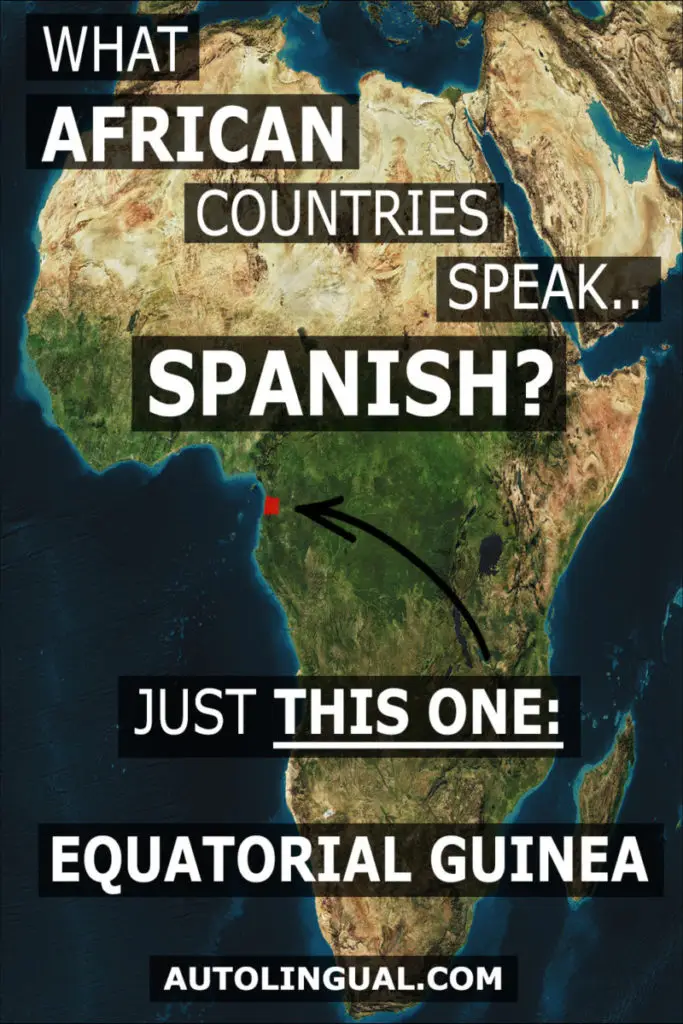Which Countries In Africa Speak Spanish? (Actually, Only Equatorial Guinea)
With 480 million native speakers, Spanish is the second most widely spoken language in the world.
The primary reason for this is of course Spain’s history as a colonial empire which spread the Spanish language to 19 countries in the Americas in the 15th-18th centuries.
But what about Africa, you might ask? The African continent, like the Americas, has been severely influenced by European colonial powers during the last few centuries, but unlike the Americas, Africa is much more known for its Portuguese, French, Dutch and English-speaking former colonies.
So aren’t there any Spanish-speaking countries in Africa?
In Africa, only one country has Spanish as an official language. That country is Equatorial Guinea, where around 68% of the population of 1,3 million people speak Equatoguinean Spanish as their mother tongue, and while Portuguese and French are co-official languages in the country, these are much less current. One reason for the Spanish language’s limited presence in Africa might be that “the scramble for Africa”, when most African territories were claimed by European powers, took place in the 19th century, when the Spanish Empire was on a steep decline.
Equatorial Guinea is a West-African country bordered by Cameroon to the North and Gabon to the South and East and with the coast of the Atlantic Ocean to the West, where the island of Bioko is located to the North of the coast of Cameroon.
How Spanish Came To Be Spoken In Equatorial Guinea
The first time European came into contact with what is now Equatorial Guinea was in 1472, when the Portuguese explorer, Fernando Pó, arrived at the Island of Bioko. The island was in turn attempted colonized by the Portuguese, but for several centuries with very little success.
in 1778, the Portuguese queen signed the island over to Spain in what is known as the treaty of El Pardo. After a failed expedition to take hold of the new colony, the Spanish only hesitantly took hold of the new colony, which they mainly used for hunting slaves.
With the Spanish abolishment of Slavery in 1817, the island became less valuable to the Spanish and it ended up being used mostly for plantations. The efforts to establish plantations were set back numerous times due to epidemics and diseases which killed many of the Spanish settlers, and for a time, the Island was mainly populated by freed slaves, African immigrants, Cubans, Filipinos as well as Jews, Catalans and and a few Spaniards - many of the latter groups being deported criminals.
It’s not impossible that the different ethnic and linguistic groups have left a footprint in the dialect of Spanish spoken in Equatorial Guinea today.
In 1926, the island of Bioko and the mainland region of Rio Muni united into Spanish Guinea, which by the time that it gained its independence in 1968 became known as Equatorial Guinea.
During the whole period in which Equatorial Guinea was a Spanish colony, Spain was preoccupied with its territories in America which all gradually declared independence during the 19th century. In addition to this, the Spanish-American war in the end of the 1800’s meant that Spain was disadvantaged when it came to settling their new colony, let alone claiming supplementary colonies.
This is probably the main reason why there aren’t more Spanish speaking countries in Africa.
Equatorial Guinea And Its Languages
Spanish, in its local dialect called Equatoguinean Spanish, is spoken by 90% of the country’s population, 68% of which being native speakers. The Equatoguinean dialect of Spanish is known for being closer to European Spanish than the Spanish variants spoken in Latin America.
The Equatoguinean Spanish dialect is the official language of Equatorial Guinea along with Portuguese and French although the latter two are spoken by a relatively small number of people.
The local and indigenous languages spoken in the country mostly belong to the Bantu family of languages (the same language family that Swahili belongs to). They include such languages as Fang, Bube, Benga, Ndowe, Balengue, Bujeba, Bissio, Gumu, Igbo, Pichinglis, Fa d’Ambô and Baseke.
To listen to an example of Equatoguinean Spanish, watch the following video:
Other Spanish Speaking Regions In Africa
Equatorial Guinea is the only sovereign state in Africa where Spanish is an official language, but one other country in Africa speaks Spanish:
Spain.
At this point you might want to point out that Spain is a European country, not an African one, but you’d only be partly right, because Spain still has some African territories (or colonies, if you will).
The Canary Islands, although not part of continental Africa, is an island group located in the Atlantic sea to the west of Southern Morocco. Before the arrival of the Spanish, the North African Amazigh (or Berber) language was spoken on the Canary Islands, but today, they’re completely Hispanophone.
The same goes for Northern Morocco, where Spain officially possesses two cities, Ceuta and Melilla, as well as Mauretania and Western Sahara where the Spanish language remain present although not dominant.

